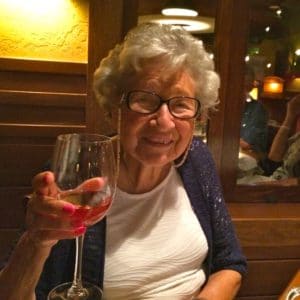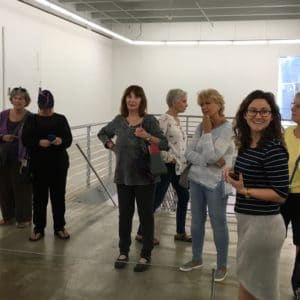By Ronni Sandroff | Aug. 2016 | Thetransitionnetwork.org
The explosion of interest came as a surprise to the organizers. It was standing-room-only at the first workshop on senior housing options hosted in 2012 by the San Francisco/Bay Area chapter of The Transition Network. This national network brings together women age 50+ as they experience personal and professional changes.
About 60 women participated in that first half day of presentation on co-living options by Chris Kennedy of Age2Age. They then broke into groups and began to connect and explore their own housing needs and desires. The choices discussed ranged from how to carefully evaluate and contract with a compatible roommate or two, to creating or joining a larger co-living community.
Four years later, TTN-HOME in the SF Bay Area is a robust group that has held more than 30 housing workshops and amassed a listserv of over 500 people who post their needs for housing and available rooms or homes for sale or rent.
Their workshops allow participants to connect with others who have similar housing concerns and to support one another as they explore their options. They’ve also hosted programs on such topics as retirement communities and affordable senior housing.
Age-friendly living
“We have people coming with a range of different needs,” says Arlene Reiff, one of the founders of the TTN-HOME planning team. Reiff helped start the group because she knew she didn’t want to live alone after her housemate of 22 years died. “Some people are thinking ‘what if’ I need some help and can’t live on my own in the future?’” says Reiff. “Others don’t want to live alone right now; they want to be part of a community and perhaps share living space, and still maintain their independence.”
Most of the attendees are women–some newly single after a death or divorce–, but some men and couples have also attended, notes Reiff, who is now embarking on a trial shared housing arrangement with a woman she met at a TTN-HOME workshop. Reiff found a house that’s across the street from her grandchildren. A dream come true.
Finances are a pressing issue for many, as the San Francisco Bay area has seen skyrocketing real estate and rental costs and the disappearance of many rent controlled units. But affluent women are interested too, and one threesome in Philadelphia has purchased real estate together for co-living and are now also sharing a winter retreat in Sarasota, Florida. Even if participants don‘t immediately find their ideal roommate or community in the TTN-HOME groups, they will find support around housing issues. The discussions help make fuzzy and even panicked thinking a little clearer.
Developed as a pilot program, TTN-HOME groups are beginning to sprout up across the country. Mona Kreaden, who is also a founder of TTN-HOME, is serving as an ambassador and consultant. “The New Jersey chapter has already had their first workshop, which was enthusiastic and well attended,” says Kreaden, who is presenting a program on TTN-HOME at the Positive Aging conference in August in Washington, D.C., and in October at the Village to Village conference in Columbus, Ohio.
Inspirations for planned communities include aging in place virtual villages such as Beacon Hill Village in Boston and Ashby Village and NextVillageSF in Berkeley and San Francisco and lower cost artist housing, such as Westbeth in Greenwich Village, NY and the Burbank Senior Artists Colony in Los Angeles. Hibiscus Common, an East Bay group that emerged from a TTN-HOME workshop, has been meeting for 1.5 years to explore buying a building for a co-living community and providing some units for affordable housing. The group has secured one small grant and is working with organizations that may be able to help with funding.
The elusive “community”
Certainly, the idea of old age communes has been around for many decades, and there are a number of models in the U.S. and abroad, but the crush of baby boomers rounding the age curve is accelerating innovation. For The Transition Network’s 14 local chapters, which act as catalysts to spark members’ life-long learning, networking, personal growth, and community enhancement, a great first step is to pull together information on local housing options and resources.
While some locales have little aside from traditional assisted living facilities, in other areas nonprofit and government groups, have identified Naturally Occurring Retirement Communities (NORCs) with an aging population that needs housing, services, and transportation options so they can “age in place.” For example, The New York Foundation for Senior Citizens http://www.nyfsc.org/, has started a home-sharing program that helps match people who need affordable housing with those who have extra rooms to rent in neighborhoods such as Sheepshead Bay and Bedford Stuyvesant in Brooklyn.
For others, “aging in place” may not be realistic, notes Jacquelyn Browne, Ph.D., LCSW, professor of gerontology at Nova Southeastern University in Florida. Children and friends may move away, and the old neighborhood can become too run down or too expensive for older people. Or, that house in the suburbs may become too isolating. “Like many younger folks, seniors may want an urban area near cultural venues, and with public transportation, so they don’t have to worry about driving,” says Browne.
One of the benefits of growing older, notes Browne, is that “our brains have accumulated more information and therefore more patterns from which to draw conclusions. This offers more ways of looking at things and therefore, expanded options when making choices.” She expects to see much innovation as baby boomers use their creativity to work through their living options.
Helping people tend their “Inner Home” is TTN-HOME’s latest stand alone workshop. It tackles “the barriers we create for ourselves that prevent us from moving, such as accumulated clutter,” Kreaden says. “Sometimes you have to clean up your inner home before you can begin to imagine looking for a new one.”






I was studying some of your articles on this website and I conceive this site is real instructive! Continue putting up. Jacinthe Daryle Dave